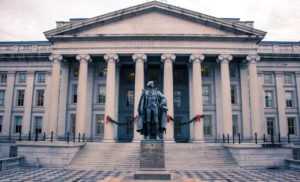
HUD reduces federal oversight of affordable housing, President Trump issues memo to exclude undocumented immigrants from the census, and more…
IN THE NEWS
- U.S. Department of Housing and Urban Development Secretary Ben Carson announced the termination of an Obama-era rule requiring local governments to track patterns of poverty and segregation in accordance with the Fair Housing Act. Secretary Carson stated that the regulation was “unworkable and ultimately a waste of time for localities.” In its place, the Office of Fair Housing and Equal Opportunity published a final rule limiting federal oversight of local housing programs. Jesse Van Tol, CEO of the National Community Reinvestment Coalition, said that the new policy gutted the enforcement mechanism of the Fair Housing Act, such that instead of reporting metrics, “now local communities simply have to tell the government that they are furthering fair housing.”
- President Donald J. Trump issued a memorandum that calls for the Secretary of Commerce to try to gather information that could lead to the exclusion of undocumented immigrants from counting toward population totals in the final 2020 census count. In the memorandum, the President argued that the power to conduct the census and define who qualifies as an “inhabitant” lies with the executive branch. The memorandum does not explain how to identify census responses by undocumented immigrants. Governor Gavin Newsom of California, a state home to an estimated two million undocumented immigrants, said that “this latest action by the Administration to exclude undocumented immigrants when determining representation in Congress, rooted in racism and xenophobia, is a blatant attack on our institutions and our neighbors.”
- Oregon’s Attorney General filed a lawsuit against several federal agencies, including the U.S. Department of Homeland Security, for allegedly arresting and detaining Portland residents illegally. The lawsuit states that armed, unidentified federal officers dressed in camouflage confronted people protesting police brutality and detained them in unmarked vans. The federal officers allegedly failed to tell the protesters why they were being detained, write official arrest citations, or provide access to counsel. President Donald J. Trump tweeted that his Administration was “trying to help Portland” because Portland “lost control of the anarchists and agitators.” Several of the state’s top officials reportedly stressed that federal agents were not needed to control the protests. Governor Kate Brown viewed the Administration’s actions as a political ploy and reportedly said that “the Trump Administration needs to stop playing politics with people’s lives.”
- The U.S. Department of the Treasury issued a final regulation that will lower the U.S. tax burden for multinational corporations operating in high-tax foreign countries such as France and Japan. The new regulation clarified that corporations operating in countries with tax rates above 18.9 percent would not be subject to taxation on Global Intangible Low-Taxed Income, an income designation that applies to companies facing foreign tax rates lower than domestic rates. In a statement, U.S. Senator and ranking member of the Senate Committee on Finance Ron Wyden (D-Ore.) criticized the new regulations as an overreach of the Treasury Department’s authority and an unwarranted gift to multinational corporations.
- The U.S. Food and Drug Administration (FDA) authorized the use of so-called pooled samples when testing for COVID-19. Sample pooling increases the capacity, efficiency, and quantity of COVID-19 testing by allowing up to four individual swabs to be tested at the same time. If a pooled sample tests positive for COVID-19, each sample is then tested individually to identify which sample—and, in turn, which sample donor—is positive for the virus. As a result, sample pooling is apparently less effective in areas with high infection rates. FDA Commissioner Stephen M. Hahn emphasized that sample pooling will become “especially important as infection rates decline and we begin testing larger portions of the population” because it preserves supplies while still allowing for broadscale testing.
- The Florida Education Association, along with teachers and parents, filed a lawsuit against the Florida Department of Education and Florida Governor Ron DeSantis for defying federal recommendations in an emergency order requiring schools to “open brick and mortar schools at least five days per week for all students.” The complaint alleges that “reopening schools in the middle of a COVID-19 resurgence, and without the proper plan, resources, and safety precautions, will inevitably exacerbate the spread of the virus, jeopardize public health, and ultimately cause longer closures.” Florida Education Commissioner Richard Corcoran said that the suit was “frivolous” as the emergency order “did not order any new directives regarding the requirements of schools to be open,” but instead gave families “the choice to decide what works best for the health and safety of their student and family.”
- European Union leaders agreed to a $857 billion spending plan to provide stimulus relief for the depressed European economy. To raise funds for the stimulus package, European countries will sell bonds collectively rather than individually. In a first for the European Union, significant portions of the stimulus funds will be allocated to the countries hit hardest by the pandemic, in the form of grants that do not have to be repaid. The grants were met with criticism from the “frugal five”—the Netherlands, Sweden, Austria, Denmark and Finland. A compromise to assuage the financially conservative countries trimmed the proposed budget, but left the grants in place. Rosa Balfour, the director at the Carnegie Endowment for International Peace reportedly said, that the EU’s stimulus package is “an upgrading of supranational institutions’ role and power…in a very significant way.”
- The U.S. Department of Defense issued guidance that effectively banned displays of the Confederate flag on any property leased by the Department and affiliated military installations. Although the memo never mentioned the Confederate flag by name, it included a list of approved flags and explicitly prohibited flying any flags not on the list. Defense Secretary Mark T. Esper emphasized that flags are “powerful symbols” that “must accord with the military imperatives of good order and discipline, treating all our people with dignity and respect, and rejecting divisive symbols.”
- The U.S. Court of Appeals for the District of Columbia Circuit affirmed a lower court injunction on a series of Trump Administration policies that would have denied asylum to women fleeing domestic abuse and gang violence. The plaintiffs, a group of 12 asylum-seekers, challenged the policies on the ground that they raised the standard for demonstrating a “credible fear” of persecution above that intended by Congress in the Illegal Immigration Reform and Immigrant Responsibility Act. Blaine Bookey, legal director at the Center for Gender and Refugee Studies, applauded the decision as a victory for refugees and an affirmation “that the Administration cannot just change the rules of the game with the stroke of a pen.”
- Israel’s Parliament passed legislation that will allow Shin Bet, the country’s domestic intelligence agency, to use cell phone tracking technology to monitor the spread of the COVID-19. The new law permits Israel’s Health Ministry to work in partnership with Shin Bet until January 2021 to facilitate contact tracing in an effort to curb the country’s latest wave of coronavirus infections. Tehilla Shwartz Altshuler, senior fellow at the Israel Democracy Institute, pointed out that the new law could potentially have a deleterious effect on the country’s technology industry in light of a ruling by the Court of Justice of the European Union limiting the ability of companies that operate in countries with looser privacy protections to do business in the EU market.
WHAT WE’RE READING THIS WEEK
- In a newly released working paper, Chris Brummer, professor at Georgetown University Law Center, reported a glaring lack of African Americans in senior leadership roles at federal financial agencies. Brummer found that U.S. Senators have only once recommended an African American for nomination to a key leadership role in a financial agency. Brummer emphasized that both political parties have unilaterally failed to hire and nominate African Americans to these positions. Brummer considered several theories to explain this discrepancy, but ultimately concluded that empirical data are not sufficient to reveal the root causes of “widespread structural exclusion of African Americans from positions of financial regulatory influence.” He emphasized the need for more robust qualitative evidence to contextualize this failure.
- In an article for the Maryland Law Review, Gabriel Scheffler, associate professor at the University of Miami School of Law, questioned assumptions that the federal rulemaking process benefits businesses at the expense of the public. Scheffler pointed to the absence of established literature on the magnitude of business influence on the rulemaking process and uncovered the limitations of system influence. Through an analysis of the U.S. Department of Transportation’s 2015 so-called tank car rule, Scheffler demonstrated that the regulatory process may still serve the public interest through effective prohibitions on business interference. Scheffler concluded by suggesting that major reforms to thwart business interference in the rulemaking process may not be necessary and could actually have the opposite effect.
- In a transcript published in The Journal of Financial Crises, Andrew Metrick, director of the Yale Program on Financial Stability, spoke with the late former Federal Reserve Chairman Paul Volcker. In a discussion that ranged from the Federal Reserve’s role as financial regulator to the impact of politics on regulation, Volcker reflected on his experiences at the Federal Reserve in the 1970s and 80s and the lessons they might bear on contemporary financial regulation. Metrick specifically asked Vocker about his thoughts on how to manage the too-big-to-fail problem, the theory that the government has an affirmative responsibility to rescue failing corporations and financial institutions in order to prevent economic collapse. Volcker elaborated on his view that regulatory policy is of greater import than monetary policy in that area, noting that “in this day and age, monetary policy is pretty straightforward one way or another. You tighten or you ease.”
FLASHBACK FRIDAY
- In a 2019 essay for The Regulatory Review, Richard J. Pierce, Jr., professor of law at George Washington University Law School, argued that the U.S. Supreme Court’s decision in Biestek v. Commissioner of Social Security tacitly approved the use of junk science as the basis for administrative policies. Pierce maintained that when the court emphasized that the expert witness standards prescribed by the Federal Rules of Evidence were inapplicable to administrative hearings, the Court ignored crucial safeguards against the use of dubious scientific evidence that had been enshrined in the Court’s historic 1992 decision, Daubert v. Merrell Dow Pharmaceuticals. Although the three dissenting Justices of Biestek seemed optimistic that lower courts would not read the majority opinion as a categorical endorsement of junk science, Pierce expressed concern that such a reading is likely.



